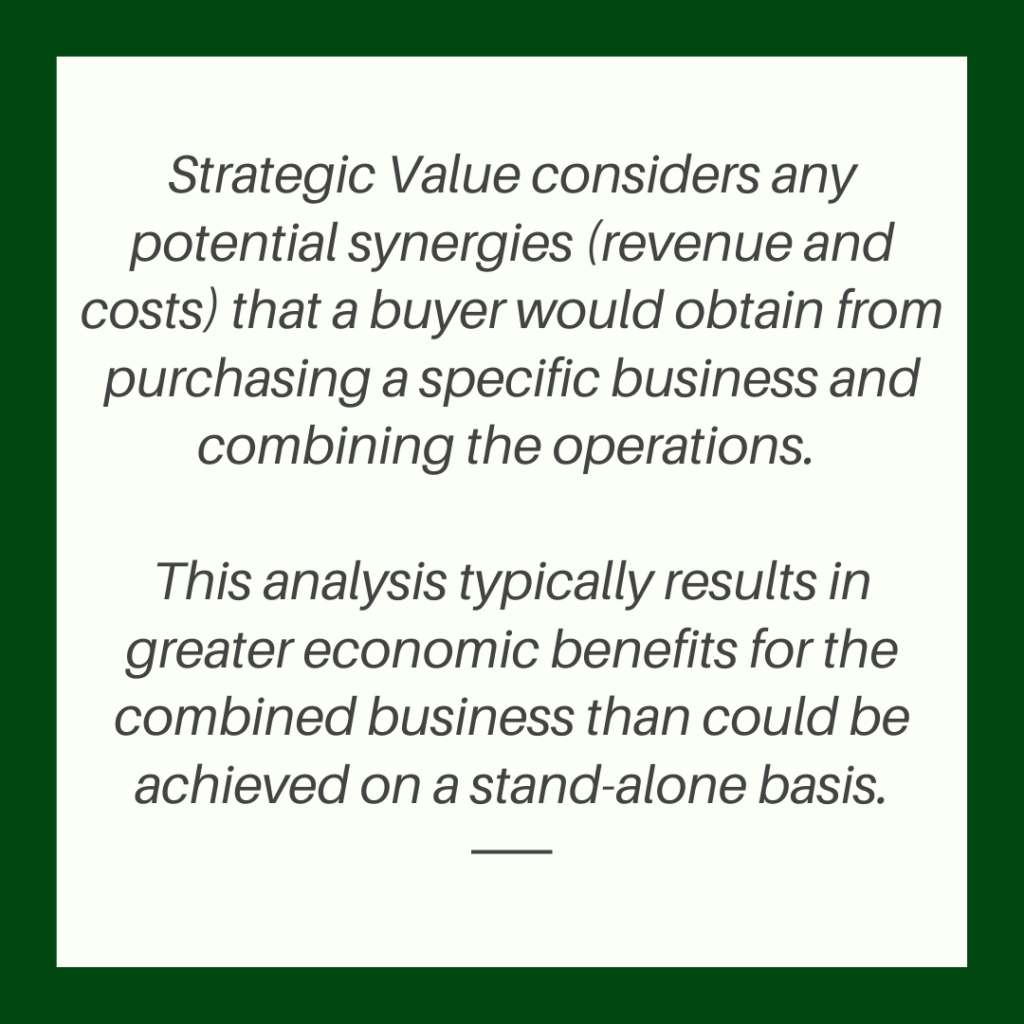As business valuation professionals, we are often tasked with determining the value of a block of stock in a company, typically a partial interest, for purposes of gift or estate tax planning, stock option issuance, ESOP compliance, or marital disputes. The appropriate standard of value for such assignments is “Fair Market Value.”
Fair Market Value is defined as the price at which the property would change hands between a willing buyer and a willing seller when the former is not under any compulsion to buy, and the latter is not under any compulsion to sell, both parties having reasonable knowledge of relevant facts.
Fair market value does not consider the synergies of a specific buyer. Instead, it contemplates an unrelated, third-party buyer and assumes the company continues to operate as a stand-alone business. Valuation professionals must also consider the rights and restrictions specific to the block of shares (or partial interest) that are being valued.
In contrast to Fair Market Value assignments, we are sometimes asked to value a company that is contemplating a sale to a third party. In most cases, the client wants to know what their business is worth to a “specific” buyer or a group of buyers within the relevant industry. For this type of assignment, the appropriate standard of value is “Strategic Value.” Strategic Value can be defined as the value of an asset or business to a specific buyer.

Strategic Value considers any potential synergies (revenue and costs) that a buyer would obtain from purchasing a specific business and combining the operations. This analysis typically results in greater economic benefits for the combined business than could be achieved on a stand-alone basis.
Although valuation professionals generally consider similar approaches and methods, the value conclusion can be significantly higher under the Strategic Value standard due to the following reasons:
- Valuation Adjustments Applied – Strategic Value assignments require the analysis of potential synergies that a buyer/seller could achieve as a combined entity. As such, the seller’s cash flow may be significantly enhanced due to administrative/executive cost savings, buyer pricing/cost advantages, and other synergies such as an existing sales force, existing facilities, and distribution networks. In Fair Market Value assignments, valuation professionals should not consider “buyer” specific synergies, but instead they should analyze the business based on current conditions available to all potential buyers of the subject interest.
Methods Employed – Although the methods employed are generally similar, depending on the data available, valuation professionals may consider applying more weight to a market approach (Comparative Transaction Method) in determining strategic value.
- The multiples derived from this method typically result in a control or strategic value for the enterprise and incorporate buyer synergies for similarly situated companies. In Fair Market Value assignments, valuation professionals may apply greater weight to an income approach, which typically results in a “minority” level of value and is based on stand-alone business operation assumptions. When applying the income approach under the Strategic Value standard, the analyst may consider the expected growth rate, cash flow, and cost of capital for the company when combined with the buyer.
Discounts Applied – In Fair Market Value assignments, valuation professionals should consider and apply appropriate discounts relative to the interest being valued.
- These include discounts for lack of control and discounts for lack of marketability. This is because an unrelated third-party buyer would be “stepping into the shoes” of the seller and would be subject to the same shareholder restrictions, assuming the business continues as a stand-alone entity. In contrast, the Strategic Value of a block of shares or partial interest is typically equal to the pro-rata value of the company, without consideration of such discounts. This is because, under Strategic Value, the company is presumed to be sold and combined with a strategic buyer. The net sale proceeds would then be distributed to the shareholders in an amount equal to their pro-rata interest in the company.
As discussed above, the Fair Market Value of a block of stock can be significantly different than Strategic Value. This is due largely to the potential synergistic benefits realized when combining companies, the assumptions and methods utilized under each standard of value, and whether valuation discounts are applied. In most cases, Strategic Value is significantly higher than Fair Market Value. Therefore, it is important that your valuation firm discuss the standard of value to be utilized, why it is appropriate, and how it will be applied prior to starting the valuation process.
Members of the Business Valuation Practice Group of Evergreen Advisors offer you reliable business valuation advice and well-reasoned opinions. Our findings are supported by actual market transactions, the most recent industry and economic research, the latest in valuation methodologies, and actual transaction experience. We have experience with a wide range of industries and can assist you with a variety of business valuation advice in connection with the following services: Estate and Gift Tax Planning, Fair Value for Financial Reporting, Equity Incentive Plans (409A), Employee Stock Ownership Plans (ESOPs), Transaction Support, and Fairness & Solvency Opinions.
Have questions? Please contact us at 410-997-6000.

